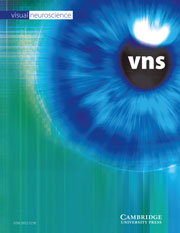Article contents
Projections of single retinal ganglion cells to the visual centers: An intracellular staining study in a plethodontid salamander
Published online by Cambridge University Press: 01 May 1999
Abstract
The projection specificity of retinal ganglion cells and the morphology of their terminals were studied in the plethodontid salamander Plethodon jordani. In an in vitro approach, ganglion cells were stained with biocytin and reconstructed by means of light microscopy. Single retinal ganglion cells often have multiple terminal structures in the thalamus, pretectum, and tectum. The projection pattern in the diencephalic neuropils is related to the depth of the terminal arbor within the tectal fiber layer. Terminal arbors in the tectum differ in location, size, and branching pattern. The following types could be distinguished: The most superficial of the optic terminals in layer 1 are relatively small with a diameter of about 100 μm. With the exception of a few varicosities (beads) in the pretectal neuropils, their stem axons have no further collaterals or terminal arbors in the diencephalic neuropils. Intermediate terminals in layer 2 fan out to form a dense plexus with a medio-lateral extent of 180 μm on average. Some terminals in this layer show obvious antenna-like fibers reaching toward the surface of the tectum. The axons of layer 2 projecting neurons have additional collaterals and terminal arbors in the thalamus and pretectum. The deep layer 3 terminals spread out over a diameter of 400 μm on average and their degree of branching is moderate. The axons of layer 3 projecting ganglion cells have dense additional terminal arbors in the thalamus and pretectum. The deepest retinal terminals in the tectum are found within the predominantly efferent fiber layers. This type consists of an unbranched, but beaded axon which runs rostro-caudally with several bends and loops. The stem axon has an additional very dense terminal arborization in the neuropil of the nucleus Bellonci pars medialis and additional sparse collaterals in the pretectal area.
- Type
- Research Article
- Information
- Copyright
- 1999 Cambridge University Press
- 12
- Cited by


